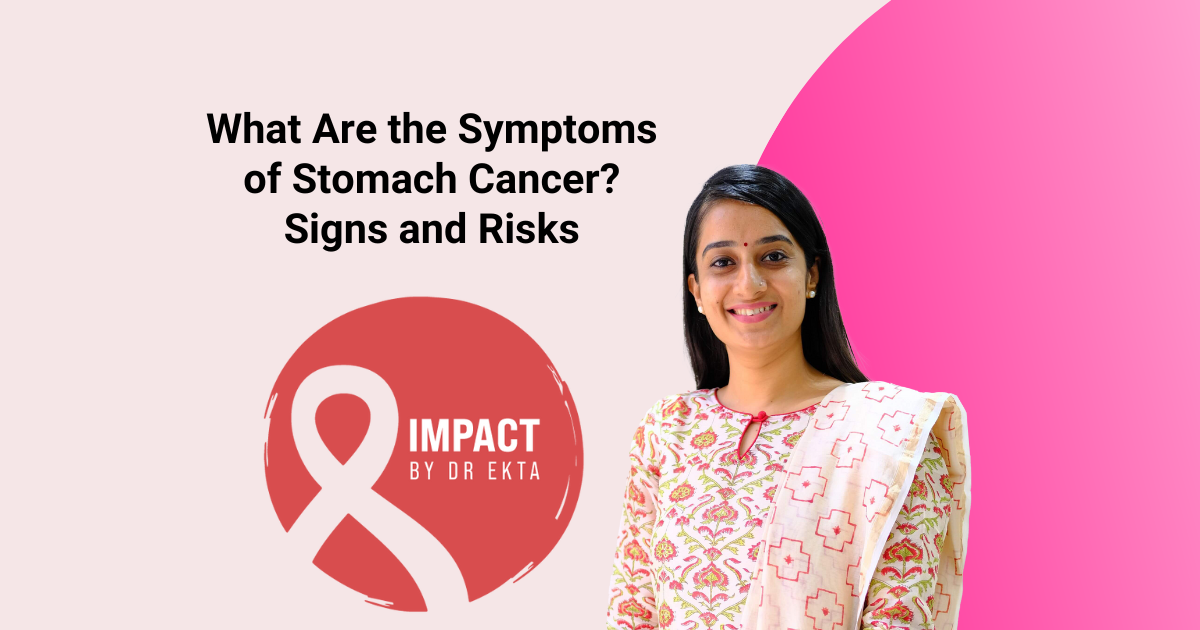Stomach cancer, also known as gastric cancer, is a serious disease that often develops slowly over many years. Early detection is crucial, as symptoms may not appear until the cancer has progressed. Understanding the warning signs, risk factors, and available treatment options can help individuals take proactive steps toward better health.
Understanding Stomach Cancer
It occurs when abnormal cells grow uncontrollably in the stomach lining. It is classified into different types, with adenocarcinoma being the most common, accounting for nearly 90-95% of cases. Other rare types include lymphomas, gastrointestinal stromal tumors (GISTs), and neuroendocrine tumors.
Early Symptoms of Stomach Cancer
In the initial stages, stomach cancer may not cause noticeable symptoms. However, some early warning signs to look out for include:
- Persistent Indigestion (Dyspepsia): Frequent discomfort or burning sensations in the stomach after eating.
- Bloating After Meals: A constant feeling of fullness even after small meals.
- Mild Nausea: Feeling nauseous without an apparent cause.
- Loss of Appetite: Unexplained aversion to food or a sudden decrease in appetite.
- Heartburn or Acid Reflux: Chronic acid reflux or heartburn that does not improve with medication.
Advanced Symptoms of Stomach Cancer
As it progresses, symptoms may become more severe and noticeable:
- Unexplained Weight Loss: Losing weight without changes in diet or physical activity.
- Persistent Abdominal Pain: Pain in the upper abdomen that may be dull, aching, or severe.
- Difficulty Swallowing (Dysphagia): A sensation of food getting stuck in the throat or chest.
- Blood in Stool or Vomiting Blood: Stools that appear black or tarry and vomiting blood (which may resemble coffee grounds).
- Weakness and Fatigue: Persistent tiredness due to anemia or poor nutrient absorption.
- Swelling in the Abdomen: Fluid buildup in the stomach area, leading to discomfort and bloating.
Risk Factors for Stomach Cancer
Several factors can increase the likelihood of developing the disease, including:
- Helicobacter pylori (H. pylori) Infection: A bacterial infection that can lead to chronic stomach inflammation and ulcers.
- Diet High in Salt and Processed Foods: Regular consumption of salty, smoked, or processed foods.
- Family History of Stomach Cancer: Genetic predisposition to the disease.
- Tobacco and Alcohol Use: Smoking and excessive alcohol intake increase the risk.
- Chronic Gastritis: Long-term inflammation of the stomach lining.
- Obesity: Excess weight is linked to increased stomach cancer risk.
- Previous Stomach Surgery: Individuals who have had stomach surgeries for ulcers or other conditions may be at higher risk.
How Stomach Cancer is Diagnosed
If stomach cancer is suspected, a doctor may recommend several tests to confirm the diagnosis:
- Endoscopy: A thin, flexible tube with a camera is inserted into the stomach to look for abnormalities.
- Biopsy: A small tissue sample is taken from the stomach for analysis.
- Imaging Tests (CT Scan, MRI, PET Scan): Helps detect the spread of cancer.
- Blood Tests: Certain markers in the blood may indicate stomach cancer.
- Barium Swallow X-ray: A specialized X-ray that highlights stomach abnormalities.
Treatment Options for Stomach Cancer
The treatment approach depends on the stage of the cancer, overall health, and individual factors. The most common treatments include:
1. Surgery
- Subtotal Gastrectomy: Partial removal of the stomach.
- Total Gastrectomy: Complete removal of the stomach with reconnection of the digestive tract.
- Laparoscopic Surgery: Minimally invasive techniques for early-stage cancer.
2. Chemotherapy
- Used to shrink tumors before surgery (neoadjuvant chemotherapy) or eliminate remaining cancer cells after surgery (adjuvant chemotherapy).
- Can be combined with radiation therapy for improved effectiveness.
3. Radiation Therapy
- High-energy radiation targets cancer cells, often used alongside chemotherapy.
- Helps relieve symptoms in advanced cases.
4. Targeted Therapy
- Focuses on specific molecules that drive cancer growth.
- Trastuzumab (Herceptin) is used for HER2-positive stomach cancer.
5. Immunotherapy
- Stimulates the immune system to fight cancer.
- Pembrolizumab (Keytruda) is an option for advanced cases.
Preventing Stomach Cancer
While not all cases can be prevented, adopting a healthier lifestyle can significantly lower the risk:
- Maintain a Balanced Diet: Increase intake of fresh fruits, vegetables, and whole grains.
- Limit Salt and Processed Foods: Avoid smoked, pickled, and highly processed foods.
- Quit Smoking and Limit Alcohol: Reducing these habits lowers cancer risk.
- Treat H. pylori Infection: Seek medical attention for persistent stomach issues.
- Regular Screenings: Individuals with a family history of stomach cancer should undergo routine check-ups.
Living with Stomach Cancer
A stomach cancer diagnosis can be challenging, but with proper management, patients can maintain a good quality of life:
- Nutritional Support: Work with a dietitian to adjust eating habits.
- Emotional Support: Joining cancer support groups can help with coping.
- Physical Activity: Engaging in light exercises can improve energy levels.
- Regular Medical Follow-Ups: Ensuring timely check-ups for monitoring.
Conclusion
Stomach cancer is a serious but treatable condition, especially when detected early. Recognizing the symptoms and understanding the risks can lead to early intervention and better treatment outcomes. If you or a loved one experience persistent digestive issues or unusual symptoms, consult a doctor for a thorough evaluation. Early detection can make a significant difference in the fight against stomach cancer.

